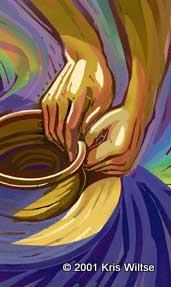When I felt fear in the old days, I just felt fear. But since I learned about the law of attraction, which has become mainstream since the movie The Secret came out, things have gotten much more complicated. In a nutshell, the law of attraction means that like attracts like: positive thoughts attract positive things and negative thoughts attract negative things. So, basically, if I dwell on the things that scare the crap out of me, I’ll create them.
Now I’m scared of being scared.
On some level, this strikes me as wrong. Emotions are messengers that bear information for us, and we ignore them at our peril. They must be invited in, heard, and then released. Carl Jung said that what we resist persists, and being afraid to fear seems like resistance to me. If I resist fear, won’t I create what I fear?
Instead of resisting fear, what if I felt it, made a decision about how I’m going to respond to it, and then moved on? Fear motivates us to act like nothing else does, and perhaps I just need to work up the courage to feel and transmute it.
This works for me on a philosophical level, but on a practical level, I hate feeling fear. I have never understood why people go to horror movies.
But hang on a minute. What if my fear is just a judgment? Raising a son brings many opportunities for fear and watching Adrian has often made me wonder how our species survived. When he was younger, Adrian seemed to need to take risks. Life for him was a perpetual if-then loop. If I do this, then what will happen? It was challenging to balance his need to explore with my desire for him to survive his childhood. But he has survived, and all the things I considered risky did not turn out to be fatal after all. I feared for his life and in my fear, I judged many things dangerous that didn’t turn out to be.
Walt Whitman wrote “Be curious, not judgmental.” What if, instead of judging that whatever I fear (and indeed, fear itself) is bad, I were curious instead?
What if?









 September 15, 1965~September 21, 2007
September 15, 1965~September 21, 2007